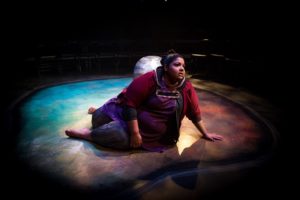Anishinaabe playwright brings solo performance to Thunder Bay

By Rick Garrick
THUNDER BAY — Fort William playwright, performer and poet Yolanda Bonnell returned home to perform her solo play bug in early October and to lead two workshops in late September.
“It’s really important to me to be centering Indigenous women because I think that our voices keep getting silenced,” Bonnell says. “So I just want to keep supporting women to use our voices. Women, two-spirit, non-binary folks, we’re the most at-risk people, and I feel like anyone who sees this work or sees work that is made by Indigenous women, they have a responsibility to spread that good work and spread that information and the story they heard.”
Bonnell performed the Robinson Treaty Tour of bug on Oct. 1-2 at Cambrian Players in Thunder Bay and led an Indigenous Women Workshop on Sept. 26 and an Indigenous Youth Workshop on Sept. 27 at the Fort William First Nation Culture Room.
“I’ve always wanted to act and write and sing,” Bonnell says. “I started writing when I was in Grade 2 — I wrote my first poem. So it’s something I’ve always wanted to do, and in 2011, I sort of decided this is what I want to do as a living. And that is kind of hard to do here sometimes so I decided I was going to move to Toronto and go to theatre school and become an actor and I did it.”
Bonnell says she developed the idea for bug while walking to school and seeing an insect crossing the sidewalk.
“I almost stepped on it and thought of that struggle of always trying to get somewhere and saw the difference of privilege, of being bigger or smaller, and then the correlation of that between Indigenous people, particularly Indigenous women, and settlers and colonialism and what the means,” Bonnell says. “So that sort of allegory wasn’t lost on me, the way insects get treated by people and the way that Indigenous women particularly get treated by people as well. We see that with the Missing and Murdered Indigenous Women and Girls.”
Bonnell says the response of the audience “felt pretty good.”
“A lot of Indigenous women came up to me and felt seen and heard and thanked me for my work,” Bonnell says. “That’s always important to me — people were saying that it was their life, that they could see themselves in the work and that’s really important to me with any work that I create that people feel represented or seen or heard.”
Fort William First Nation’s Lynda Banning says the performance was “very good.”
“I’ve known Yolanda for many years from when she was a young girl so I was very happy to see that she is fulfilling her lifelong dream,” Banning says. “The subject was very emotional to me.”
Fort William’s Cindy Bannon says the performance was “quite emotional.”
“There’s more meaning to it than just what you saw,” Bannon says. “There’s deeper meaning in it because it had to do with not just the story behind it but her movements, the emotions, her inner movements and the music like she said.”
Chippewas of the Thames’ Gloria Hendrick-Laliberte says the performance was “very powerful, very moving.”
“The movement made it so expressive,” Hendrick-Laliberte says. “The only word I can comment on is powerful and moving, inspirational.”
Shaundra Benincasa, stage manager with Cambrian Players, says it was important to stage the play to tell stories from different perspectives.
“To tell the history and the culture and to open up people’s minds and delve deep into the real struggles that they don’t know about happening [with] Indigenous women especially,” Benincasa says.

